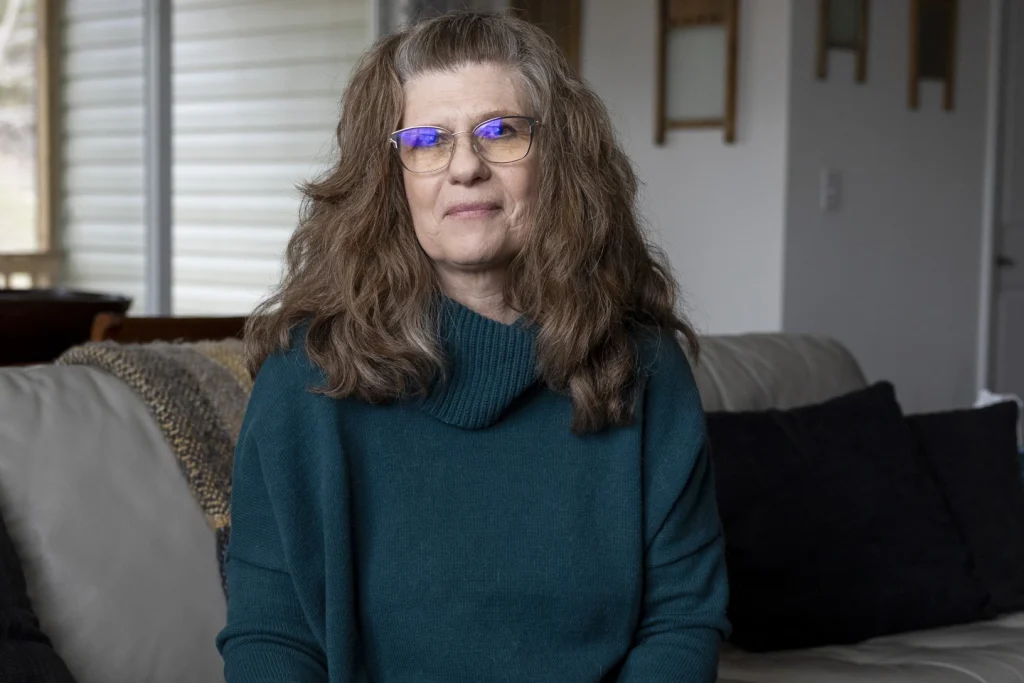The rise of popular obesity drugs such as Wegovy has offered a glimmer of hope for millions of Americans struggling with weight loss and its associated health issues.
However, as individuals experience significant weight loss and improved health outcomes while on these medications, a pressing concern emerges – what happens when they discontinue their usage?
The fear of weight regain and a return to unhealthy habits looms large for many individuals, prompting a debate on the best approach to transitioning off these drugs.
This essay delves into the complexities surrounding the discontinuation of obesity drugs, exploring the experiences of individuals like Donna Cooper, medical perspectives from experts, and the broader implications for managing obesity as a chronic condition.
For individuals like Donna Cooper, who have witnessed transformative weight loss results with the help of obesity drugs like Wegovy, the prospect of eventually discontinuing these medications raises valid concerns.
After shedding nearly 40 pounds in nine months through a combination of Wegovy, diet modifications, and exercise, Cooper reflects on the necessity of eventually weaning off the drug.
She acknowledges the role of Wegovy as a supportive tool in her weight loss journey but expresses reluctance to rely on it indefinitely.
This sentiment echoes a common sentiment among individuals using obesity drugs – the desire to achieve sustainable weight management without perpetual reliance on medication.
Medical experts, however, caution against hasty decisions to discontinue obesity drugs, emphasizing the chronic nature of obesity as a condition that requires ongoing management.
Dr. Andres Acosta, an obesity researcher and medical adviser at the Mayo Clinic, underscores the continuous nature of treatment for obesity, likening it to managing conditions like heart disease or high blood pressure.
The mechanism of action of drugs like semaglutide and tirzepatide, which regulate appetite and satiety by mimicking gut and brain hormones, is optimized for continuous use, as per experts.
Despite medical guidance advocating for continuous usage of obesity drugs, a growing number of individuals are exploring alternative strategies to navigate the transition off these medications.
Some opt for self-directed approaches such as stretching out doses, intermittent usage, or on-demand cycles of drug intake.

Dr. Amy Rothberg, an endocrinologist at the University of Michigan, notes a trend among patients who have achieved their weight and health goals with obesity drugs, seeking ways to discontinue usage.
This divergence in perspectives between medical recommendations and patient preferences underscores the complex nature of managing obesity and the individualized nature of treatment decisions.
While experts stress the importance of continuous drug usage for optimal outcomes, patient autonomy and concerns about long-term medication use drive individuals to seek alternative strategies for weight maintenance.
The dilemma of discontinuing obesity drugs like Wegovy and Ozempic raises broader questions about the approach to managing obesity as a chronic condition.
As the prevalence of obesity continues to rise globally, the need for comprehensive and sustainable treatment strategies becomes increasingly urgent.
Balancing the benefits of pharmacological interventions with the challenges of long-term drug dependence requires a nuanced understanding of individual needs and preferences.
Moving forward, a collaborative approach that integrates patient perspectives, medical expertise, and evidence-based guidelines is essential in navigating the complexities of obesity management.
Empowering individuals with the knowledge and resources to make informed decisions about their health while ensuring access to comprehensive care and support systems can enhance the effectiveness of obesity treatment strategies.
In conclusion, the dilemma of discontinuing obesity drugs represents a multifaceted issue that intersects individual experiences, medical recommendations, and broader implications for managing obesity as a chronic condition.
As individuals like Donna Cooper grapple with the decision to transition off medications like Wegovy, the need for a balanced approach that considers both short-term weight loss success and long-term health maintenance becomes evident.
By fostering dialogue, understanding diverse perspectives, and promoting collaborative decision-making, we can navigate the complexities of obesity management and support individuals in achieving sustainable health outcomes.

In the journey towards effective obesity treatment, acknowledging the nuances of discontinuing obesity drugs is crucial in shaping comprehensive and patient-centered care strategies.
As we navigate this evolving landscape, a holistic approach that prioritizes individual well-being, informed decision-making, and ongoing support can pave the way towards improved health outcomes and enhanced quality of life for individuals grappling with obesity.
The decision to pause the use of certain medications, as highlighted by Dr. Katherine Saunders, an obesity expert at Weill Cornell Medicine and co-founder of Intellihealth, can be influenced by a variety of factors.
Patients may discontinue their medication due to undesirable side effects such as nausea and constipation. Others may choose to temporarily halt their treatment for reasons such as holidays or special occasions, or simply because they are hesitant to commit to ongoing weekly injections.
An illustrative case presented by Saunders involves a 53-year-old man from New York who successfully lost 70 pounds using a medication called Mounjaro.
Expressing a desire to give his body a break from the medication, he followed Saunders’ recommendation to space out his injections to every 10 days or two weeks instead of weekly.
This decision was made in December and reflects a common scenario where patients adjust their medication regimen based on personal considerations.
Financial constraints can also play a significant role in the decision to pause or discontinue medication. The high cost of drugs, ranging from $1,000 to $1,300 per month, coupled with varying insurance coverage and supply shortages, may force patients to ration or cease their doses.
This situation, as noted by Rothberg, can be a challenging imposition on individuals who rely on these medications for managing their condition.
However, experts caution against the notion that the benefits of these drugs will persist after discontinuation. Obesity fundamentally alters the body’s energy processing and storage mechanisms, leading to weight gain.
The pharmacological intervention provided by these medications modifies this process, and upon cessation, the disease often resurfaces, sometimes more aggressively than before.
Patients who discontinue these medications commonly report a resurgence of obesity-related symptoms, such as heightened food cravings, increased hunger, and reduced feelings of satiety.
Rothberg explains that these drugs act as potent suppressors of natural signals within the body, and it is expected that the body’s response will reflect this alteration upon cessation of treatment.
The experience of Tara Rothenhoefer, who lost over 200 pounds through a clinical trial for Mounjaro, provides insight into the anxieties faced by individuals managing weight fluctuations post-medication.
Despite now taking the lowest dose of the drug at longer intervals, she remains vigilant about changes in her weight, underscoring the psychological impact of weight management post-treatment.
Some patients who discontinue and subsequently resume medication may find that their tolerance to the drug has diminished, resulting in severe gastrointestinal side effects.
Saunders adds that the efficacy of the medication may also diminish upon reinitiation. The long-term effects of intermittent use remain largely unexplored, leaving uncertainties about the viability of this approach for sustained weight management.
While some individuals like Donna Cooper express hope in maintaining their weight loss through alternative means post-medication, the reality of weight regain post-discontinuation looms large.

Cooper’s plan to adhere to a strict diet and exercise regimen upon exhausting her supply of Wegovy injections reflects a proactive approach to managing her weight without pharmacological intervention.
In conclusion, the decision to pause or discontinue obesity medications is influenced by a complex interplay of factors, ranging from personal preferences and financial constraints to physiological responses and long-term efficacy concerns.
As experts caution against the assumption of sustained benefits post-treatment, individuals navigating weight management post-medication must carefully consider their options and consult with healthcare providers to devise a comprehensive and sustainable approach to their well-being.
